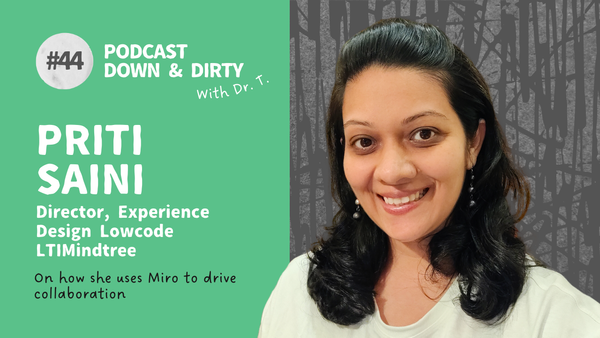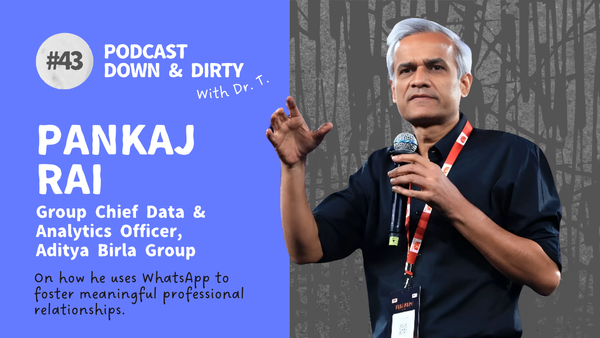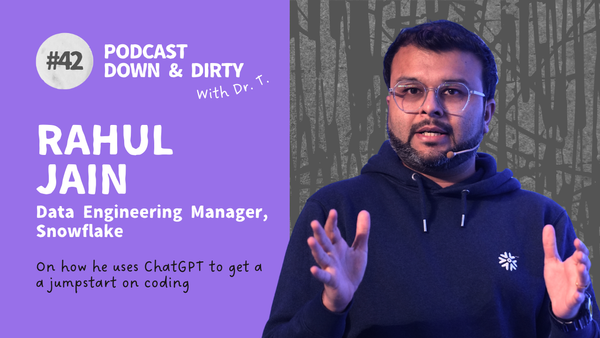💬Why would Suyash voluntarily opt for a "lower" paying job?
A banker shares his inspiring journey from early-retirement and passion project to a pandemic-led return to banking, albeit with a happy twist.

Written by Sumeet Iyer
As part of a recent Poocho study aimed at Unpacking the Great Resignation, I spoke to professionals who switched jobs during the course of the COVID-19 pandemic. The interviews focussed on understanding their motivations and considerations for a job change, challenges they faced, and expectations and experiences at their new job. One such was Suyash*, a corporate banker-turned-cafe owner-turned-cooperative banker, whose journey from entrepreneurship back to banking brought out some very interesting and honest perspectives on the ideas of work and pursuing one’s passions, especially that one elusive idea – work-life balance.
- Male
- 40 years old
- Living with parents / family
- Income ₹ 5.1 lakhs - 10 lakhs
His passion lay outside of corporate banking
After spending a decade in one of the country's largest private banks, Suyash seemed to have it all figured out. He was done with the 24x7 always on corporate banking life and wanted to pursue his true passions – outdoor activities, food and being amongst nature.
“The thing is when I was in a private bank, I was not able to get the time for (things) which I really wanted to do. I wanted to spend time out in nature, go out, trekking and adventure trips. But I didn't get the time...as much as I wanted. So I thought about it...and thought...'let's start my own business.' I had already planned that my retirement will be at the age of 45. So for that reason, I had taken this step and started my business. So that within five years, I can set it (the business) up and I can do whatever I want.”
It was the good ‘ol ‘work your butt off and then retire at 45’ goal. But his commitment and self-assuredness came through when I asked him if he had any concerns about quitting his ‘stable’ corporate job and starting out on his own.
“No, no...I didn't have any concerns (then) about moving out of banking and starting on my own. It was already decided earlier, so there were no concerns at all. I had already decided that I have to be liability-free and I worked for it. When I quit my job, I was completely liability-free...still I am a liability-free man. So it was pre-planned and so all my financials were taken care of by me.”
The long and winding road back to a job at a bank
Suyash seemed to be on track to make his dreams come true. He was playing a front-and-centre role in his decade-old outdoor activities venture and living out his passion for food through his cafe. But like for most of us, in 2020, the COVID-19 pandemic landed like a bolt-out-of-the-blue. The pandemic made outdoor activities impossible and saw his cafe down its shutters merely months after opening. What happened next was inevitable.
“We had taken the decision after six months (of starting the cafe) only. My partner had joined a job. I hadn't joined a job...I was still happy with my current decision that I will not (go back and) join a job. I'll start (working on) my travel company and continue working on it. So for two-and-a-half years I have been working on it. But during this pandemic, we were not able to go trekking. Since the last six months, we have been able to go for treks but the response is not that good. So (just so that) I can survive...(and support) my family and everything...so I started looking for a job.”
I asked how he really felt about the prospect of closing down his cafe and returning to a full-time banking job. He seemed pragmatic. “It was very difficult for me to quit the things that I liked and go back again to do that...24x7 wala job. So it was a pretty harsh decision for me. But it is a part-and-parcel of...things...so I have joined it.”
It wasn’t all smooth sailing for Suyash though. The pandemic notwithstanding, many private banks saw his entrepreneurial stint as a ‘gap’ in his CV and seemed unable (and unwilling) to match his last pre-pandemic salary. “It was very difficult for me to get a job after a gap of three years. So my first priority was to contact the one who is a best buddy and who can also give me a job. So I started contacting them, even gave interviews. But due to this huge gap, they will...and since I have worked as a branch manager (previously)...so the position is pretty big. They were not able to accept me in a private company because of the huge gap.”
His last salary was not a deal-breaker for him though he was just keen on getting through the right set of leads and references to find the right opportunity. “Yeah, I was...I am open to it, but it was not discussed with me. They have presumed that he will not accept this salary or we will not be able to match this salary. So they’ve presumed (this) and have rejected me.”
When I delved deeper, I found that it wasn’t just the recruitment process and salary expectations that was a challenge for Suyash. The way some of his past colleagues and friends responded to his request for leads and references also took him by surprise. I also sensed a feeling of disappointment and betrayal.
“It's like they say...’you have a position, people will follow you’. So that’s the thing...when I was a branch manager...the perspective of people...people looking towards me, was different. As soon as I quit the job and I stayed at home, the perspective of people changed...those looking at me. It’s all about perspective...and the respect was given to that chair, not me.”
It was therefore serendipitous that he chanced upon a newspaper ad for a branch manager at a cooperative bank. He went through with it…and made it. He was to be a branch manager, at a cooperative bank, based out of a town in Maharashtra. Worlds apart from the banking environment he was familiar with. I asked him why.
His work experience was pitted against “gap years”
Having made the long trek back to banking, albeit a different kind, I asked him if he saw any similarities between his life as an entrepreneur and life at a cooperative bank and whether he was able to repurpose any learning from the former.
“Yes, definitely. In both of those things...I was responsible for that unit. Even in the cafe, I was responsible for that unit...and even in the bank, I am responsible for that whole branch. So it's pretty much the same for me...running a cafe or running a bank. I look at it from the same perspective...I am still applying the same things in my banking also. ’How I can do things differently and be able to get a good result out of it?’ ‘How can I use people at the right place so that I get a good result?’ People management is the major skill which I have to have.”
Suyash was armed with a skill that not many professionals can speak of – experience with people management and creative thinking – both in a corporate environment and as an entrepreneur. Seemingly, the best of both worlds. It seemed to me at that point that choosing to see Suyash’s experience with entrepreneurship as a ‘gap’ in his CV was the private banks’ loss…and indeed the cooperative bank's gain.
Yes, definitely. In both of those things...I was responsible for that unit. Even in the cafe, I was responsible for that unit...and even in the bank, I am responsible for that whole branch. So it's pretty much the same for me...running a cafe or running a bank. I look at it from the same perspective...I am still applying the same things in my banking also. ’How I can do things differently and be able to get a good result out of it?’ ‘How can I use people at the right place so that I get a good result?’ People management is the major skill which I have to have.
The math pointed towards the lesser paying job
Four months into the cooperative bank job, I asked him if he had made the right decision. He seemed very convinced that it was the right opportunity, at the right time.
“So though there was a financial cut... because earlier my salary was much more in private (bank) and in this cooperative bank, the salary is half...almost cut down to 50%. But I'm more happy in my current job, where I can spend time with my friends, my family...so I can be much more happy than in a private job.”
So, now that he’d met his initial goals for a job search, I asked him what he really felt about this change. His eyes lit up as he spoke. “Even today...(I feel) I didn't want to join the bank. I'm pretty much happy with the way I am. I have a good response in my outdoor activity. I'm getting good (number of) calls from all my customers, they are very happy with the way I conduct the activities. So I'm pretty much happy with it. I don't want to make money. I just want to be happy...so that is by funda (fundamental principle).” ‘Recruitment strategists, take note,’ I thought.
I was intrigued. I was also curious to know what he thought the one big change was – from Suyash the private bank branch manager to Suyash the cafe owner and now Suyash the cooperative bank branch manager. “It's an improved version,” pat came the reply. His delightful energy was indicative of a much deeper feeling, I suspected – of contentment. I got the feeling that he had chanced upon (or, dare I say, manifested) something most of us have long sought from our work identities, often, rather disconcertedly. It was that seemingly elusive and unattainable feeling of ‘balance.’ I wanted to know what he meant by ‘improved’.
“I told you na...earlier what we used to do in a private bank...that was a typical job...’Ah, go to the bank at 8.30...come back home at 9.30’...That's it. ‘Go attend con-calls (conference calls)...get the gaalis (abuses) from the bosses...hear the gaalis...come back (home) and sleep. That's it. That was a monotonous job...here I have to be creative. Here, the perspective is totally different...the perspective has been changed.”
My key takeaway from the conversation was that of hope – that with the perspective of hindsight and a renewed set of priorities, it is, indeed, possible to find that point of happiness and contentment – one that is uniquely suited to you. Whilst it is about striking the right balance, it is more about challenging how most of us were conditioned to think about work and how it interacts with our lives.
Suyash’s transition experience during The Great Resignation seems to suggest that the mirage of work-life balance is now in sight, albeit one step at a time. Apparently, you can have your cake and eat it too.
*Name changed to maintain privacy of the participant.



